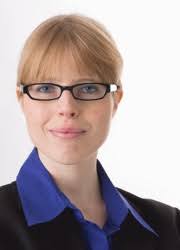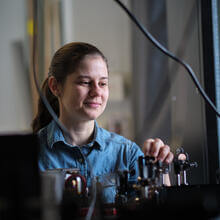Tuesday, May 24, 2022
Developing quantum simulations of particle interactions and trapped ions are two Institute for Quantum Computing research projects broadening disciplinary horizons and delivering real-world impact. Waterloo scientists Christine Muschik and Crystal Senko each received funding through the Government of Ontario’s 2022 Early Researcher Awards program.
 The standard model of particle physics is the bedrock for our understanding of Nature. Numerical simulations of subatomic physics are restricted due to inherent limitations of classical computers to simulate quantum properties. Thus, there is an inescapable need to find new methods to address numerous open fundamental questions. Quantum computers can in principle overcome these roadblocks. However, to reap the rewards of this opportunity requires the development of new quantum simulation tools for so-called gauge theories which underlay the standard model.
The standard model of particle physics is the bedrock for our understanding of Nature. Numerical simulations of subatomic physics are restricted due to inherent limitations of classical computers to simulate quantum properties. Thus, there is an inescapable need to find new methods to address numerous open fundamental questions. Quantum computers can in principle overcome these roadblocks. However, to reap the rewards of this opportunity requires the development of new quantum simulation tools for so-called gauge theories which underlay the standard model.
Christine Muschik, an assistant professor in the Department of Physics and Astronomy and member of the Institute for Quantum Computing, will develop the theoretical concepts to build these new types of quantum simulators, she will work with experimental partners on proof-of-concept demonstrations, and she will employ hybrid quantum-classical simulations that benefit from on machine learning.
By applying quantum technology to problems in particle physics, she will bridge two strong fields in Ontario, while establishing industry connections for knowledge transfer with Google and IBM.
 Quantum computing is expected to revolutionize technology. However, a major challenge in building quantum computers is the difficulty of allowing them to make decisions: given this quantum information, what should the computer do next? This difficulty arises from the fact that reading the information that tells the computer which decision to make, often corrupts the remaining quantum data due to fundamental rules of quantum measurement. Trapped ions offer a promising path to viable, hardware-based quantum computing. Trapped ions are electrically charged atoms suspended inside a vacuum chamber with electrodes. Once ions are trapped, researchers can encode bits of information in the spin of their outer electrons.
Quantum computing is expected to revolutionize technology. However, a major challenge in building quantum computers is the difficulty of allowing them to make decisions: given this quantum information, what should the computer do next? This difficulty arises from the fact that reading the information that tells the computer which decision to make, often corrupts the remaining quantum data due to fundamental rules of quantum measurement. Trapped ions offer a promising path to viable, hardware-based quantum computing. Trapped ions are electrically charged atoms suspended inside a vacuum chamber with electrodes. Once ions are trapped, researchers can encode bits of information in the spin of their outer electrons.
Crystal Senko, an assistant professor in the Department of Physics and Astronomy, will develop novel techniques to protect some quantum information while other information is being read out. Senko is the Canada Research Chair in Trapped Ion Quantum Computing. This research will raise the profile of Ontario as a leader in quantum computing research, by informing the design of next-generation quantum computers that include decision-making capabilities.
The Early Researcher Awards program helps new researchers, working at publicly funded Ontario research institutions, build a research team. The award covers equipment costs and facility expenses as well as salaries and travel for student research assistants.
Congratulations Christine and Crystal!
